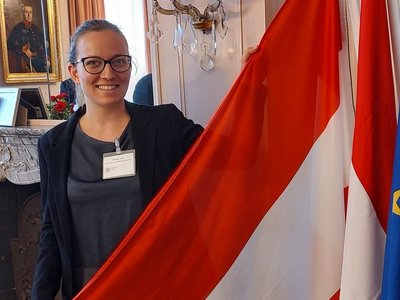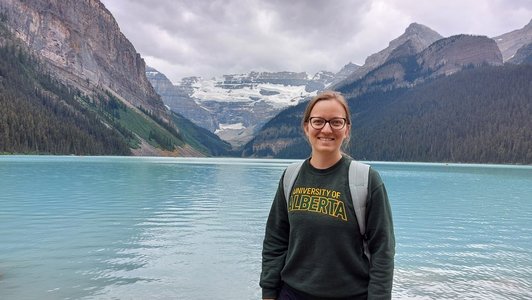

Tell us briefly about your motivation to apply for a Doctoral Research Fellowship at the University of Alberta/Edmonton. Why did you choose this topic and this institution? Why Alberta?
The subject of my dissertation is transfer processes of operettas between Vienna, Berlin and Stockholm between 1927 and 1945. In doing so I am concentrating on the adaptation strategies of originally German-language operettas for productions in Stockholm. I want to explore the context of operetta production in Stockholm and thus enable a deeper understanding of the changes.
Since I deal with an intercultural topic in my doctoral thesis I found the concept of the Wirth Institute very exciting from the very beginning: Here, exchange with other countries is practised in such a positive way! I haven’t only got colleagues from Canada but also from Poland, Hungary, the Czech Republic and Croatia. As a result I was able to get to know many different perspectives on my work as a scientist during the last year. It is very nice how the Wirth Institute celebrates the joy of the community of different countries.
Moreover, the University of Alberta offers perfect research conditions for me. Renowned experts in Viennese music and the history of Central Europe work here, from whom I was able to learn a lot. I was supported in my young scientific career in a wonderful way by the Wirth Institute – I felt very well guided and advised at conferences, in writing specialist publications and in orienting myself in this diverse and challenging professional field.
Besides these professional advantages of the fellowship at the U of A it also appealed to me to visit such a beautiful country as Canada for a year and to get to know the culture in North America better. Alberta is very scenic – before my year abroad in Canada I never saw a landscape like the “Bandlands” like the ones in Drumheller, Alberta. It looks like the moon! The Rocky Mountains with their wild nature – bears, moose, coyotes and chipmunks – are also worth seeing.
Briefly describe the main goal and results of your academic year in Canada and your project:
In my dissertation I investigate how Viennese and Berlin operettas came to Stockholm between the late 1920s and 1945 and how they were performed. I read director’s books and scores in German and Swedish and look for differences in translations. At best I can also find out why certain scenes were changed for operetta performances in Stockholm. For example, the Viennese operetta likes to make fun of the rural population outside the big city. In Stockholm translations of Viennese operettas of the 1920s people from rural areas are not portrayed in such a ridiculous way. This could be due to the fact that many operetta productions toured Sweden after a Stockholm premiere and were performed in smaller towns. Jokes about the alleged backwardness of the rural population would not have gone down well with this audience.
In the period I am investigating politics in Germany and Austria has driven many people to move or flee. Many artists who worked in the field of operetta had Jewish roots or worked in cabaret and had criticised current politics. One example of this is Max Hansen, who mocked Adolf Hitler in a song. After 1933 he was no longer able to work in Germany and moved first to Austria and after the annexation of Austria in 1938 to Denmark and Sweden. He then performed many operettas in Stockholm that he knew from Vienna and Berlin.
The role of Sweden as a host country for refugees and as a new place of work for artists is also relevant to my work. During the war years Sweden benefited economically very much from trade with Nazi Germany. In order not to offend Germany as a trading partner artistic freedom in Stockholm was also partially restricted. I find it exciting to find out what the operetta – where there has traditionally been a lot of ridicule of current world events – was like in Stockholm during that time.
Which experiences were particularly important to you? Is there a relevant anecdote or story you would like to tell?
In Canada I particularly like how so many people with a migrant background live together peacefully. I have the impression that diversity here is largely seen as something positive. There are many intercultural festivals in Edmonton that celebrate the community of different people, e.g. the Heritage Festival. In Edmonton I also discovered my love for Polish pierogi – I had never eaten them in Germany and Austria!
The most exciting thing for me was to experience the nature of Canada, whether in the Rocky Mountains or at the roaring Niagara Falls. I have seen coyotes, black bears and grizzlies, otters and even an orca fin in the sea – all fortunately from a safe distance. This was a unique experience.
What impact will the scholarship have on your personal and professional development? What are your plans for the future?
My scholarship from the OeAD has opened many doors for me and opened up career opportunities. I have taken part in three international scientific conferences and have also been able to complete three publications, all of which are closely linked to my research work at an Austrian Studies Center.
Immediately after my fellowship I was also able to successfully apply for a university position: I will work as a doctoral student at the Universitetet i Oslo in Norway. My scholarship from the OeAD has given me a considerable advantage for my application and I am very grateful for this opportunity and the trust that the OeAD has put in me and my research!
Curriculum vitae
After having completed her school education in Baden-Württemberg and an au pair year in Sweden Mirjana Plath studied art history, media studies and musicology (Bachelor of Arts) at the University of Marburg in Germany and the University of Oslo in Norway. In 2019 she completed her master's degree in musicology at the University of Vienna in Austria. Before enrolling in a doctoral programme in musicology at the University of Vienna in 2021 she worked in the cultural sector for three years, first at the Grafenegg Festival in the press department and then at the Volksoper Wien in sponsoring & fundraising.
Links
Youtube-Link to Mirjana’s Central European Talk of March 2022
In this video she briefly introduces her research topic and also presents Max Hansen’s work in Stockholm in more detail.


